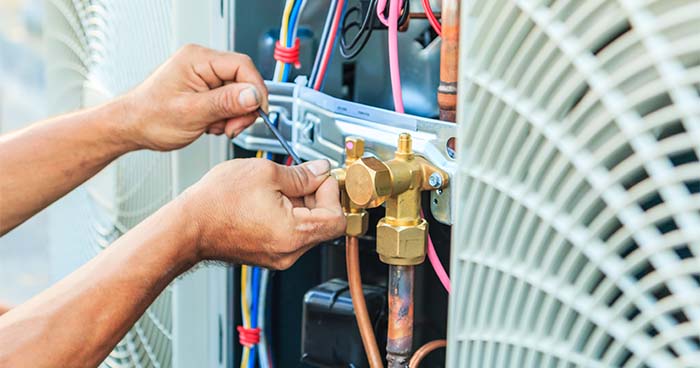Home utilities are designed to work under very hard expectations as the seasons change, namely going into summer and spring and the reverse in the fall. The typical AC or heater is installed with a life plan of at least a decade, and many folks expect it to last longer than that. However, air conditioners, furnaces, HVAC, and similar are all mechanical systems.
They operate based on parts and systems that over time wear down. They can last a very long time if maintained and cared for. However, if HVAC maintenance is ignored, it’s probably one of the top reasons why AC systems fail prematurely in the warmer months.
When to Expect a Failure
Predictably, most AC units in an HVAC system tend to have problems when needed most, in the middle of a hot summer. Many homeowners use them hard during the warm months of the year. They get turned off and not used for anywhere from four to five months during the cold months. Once it starts to heat up in the spring, the system is switched to the AC and is expected to operate just like before.
However, after sitting still for months, an older AC might start making some noises while working again. And, under serious strain, it may just stop putting out cold air altogether.
Typically, HVAC AC units depend on a couple of things to keep working well as it warms up. Here’s a checklist of maintenance items to focus on for spring and summer before the crisis happens.
First, their air filters need to be cleaned and replaced regularly. Trapped grit, pollen, mold, and dust all contribute to making the unit work harder. Clean filters avoid this, and the unit pushes air more easily throughout the day.
Secondly, the power system needs to be consistent. Erratic starting frequently will work an AC hard, wearing down motor parts from hard starts and stops.
Third, the condensing process needs to be checked as well as the drainage. If these are not working right, backup and corrosion can make short work of an AC system.
Finally, without regular checks, leaks can start that let out freon which helps the AC turn warm air cold. Without that element, the air conditioner is just an air blower.
What Early Spring HVAC Maintenance Avoids?
The benefits of HVAC maintenance can do a lot for an integrated AC before summer gets hot. Rather than waiting for problems to happen, shutting off at the worst possible moment, maintenance helps catch small issues and avoid them before things get started. That includes a professional review of the system, making sure it is operating as expected per mechanical standards, and testing internal system pressures.
All of these reviews help spot indicators or a problem brewing that can develop over time or trigger a bigger failure under significant strain. That usually happens during the hottest time of the year when the AC is run almost all day long.
Regular maintenance also helps ensure an AC unit lasts as long as it can mechanically. By providing checks, cleaning, spotting small repairs, and replacing worn-out parts, an AC can last well beyond the minimum decade or so of product life expectancy.
However, this only happens with regular updates and monitoring. If an HVAC AC is left to sit and operate without maintenance year after year, its premature failure shouldn’t be a surprise at all. And the price ticket for a full unit replacement can be fairly high.
Getting Started in Spring and Summer
There’s never a bad time for HVAC maintenance and the same for a connected AC. Even with older systems, starting up a regular check-in in February or March can still provide preventative benefits that save money and ensure the equipment will continue to keep working as expected.
The most comprehensive approach to HVAC maintenance can be provided by a professional technician. He or she will have the training and tools for the job as well as the ability to make small repairs as needed if spotted during a check. While some aspects can be handled by a homeowner, a lack of experience can miss a lot.
With a professional spring cleaning approach, a full checklist is applied for the AC model and what is to be expected from industry standards. It catches more issues regularly and benefits a homeowner more consistently.
Conclusion
In conclusion, regular maintenance of your AC system is crucial for ensuring its optimal performance during the spring and summer months. By scheduling routine inspections and servicing, you can prevent potential breakdowns and costly repairs in the future.
Additionally, maintaining your AC unit helps improve indoor air quality by reducing dust and allergens. This not only benefits your health but also enhances the overall comfort of your living space. Don’t wait until it’s too late – prioritize AC maintenance today to stay cool, comfortable, and worry-free all season long.

